FITA Academy
Empowering students across various fields, we help you enhance your skills and provide unlimited placement support until you land your dream job. Ready to learn and make an impact?
Course Highlights and Why Full Stack Developer Courses in Bangalore at FITA Academy?
Upcoming Batches
- 03-07-2025
- Weekdays
- Thursday(Monday - Friday)
- 05-07-2025
- Weekend
- Saturday (Saturday - Sunday)
- 07-07-2025
- Weekdays
- Monday (Monday - Friday)
- 09-07-2025
- Weekdays
- Thursday(Monday - Friday)
Classroom Training
- Get trained by Industry Experts via Classroom Training at any of the FITA Academy branches near you
- Why Wait? Jump Start your Career by taking the Full Stack Developer Course in Bangalore!
Instructor-Led Live Online Training
- Take-up Instructor-led Live Online Training. Get the Recorded Videos of each session.
- Travelling is a Constraint? Jump Start your Career by taking the Full Stack Developer Course Online!
Full Stack Developer Course Objectives
- Getting to know the basics of Web Development, including HTML, CSS and Javascript.
- Learn about front end development and how to use Angular or React.
- Learn about Back end development and Java/Python/Node JS/PHP/ Dot NET according to the student’s preference.
- Getting introduced to Database Management using relational databases such as MS-SQL, MySQL or non relational databases, also called noSQL databases such as MongoDB.
- Getting trained to maintain the back-end with .NET, Express, Django, etc.
- Explore open source libraries and frameworks like Bootstrap, Redux, AngularJS, NodeJS, etc.
- Build a server-side connection between the back-end and front-end.
- Apply cloud services, web security, and test cases to your project.
- Create a portfolio or Github account to document the projects applied in this course.
- Describe the product lifecycle management in Full Stack Development.
- Discuss the career opportunities for professionals with Full Stack Development skills.
- Apply knowledge gained in real-time Capstone projects such as Food Delivery web application, developing an E-Commerce website, etc, to get a practical understanding of the concepts provided in the Full Stack Developer Courses in Bangalore.
Full Stack Developer Course Trainer Profile
- Our trainers for the Full Stack Developer Courses in Bangalore are certified experts with decades of experience in Full Stack Development.
- Trainers of this program have delivered functional solutions and student success stories with their Full Stack Development expertise.
- Our trainers implement both theoretical and practical training for students.
- Our trainers deploy up-to-date platforms and versions in the course syllabus to keep up with the changing times.
- FITA Academy trainers adopt hands-on classes and live projects to improvise on your practical skills.
- Trainers help students with resume building and interview discussions.
Learn at FITA Academy & Get Your
Dream IT Job in 60 Days
like these Successful Students!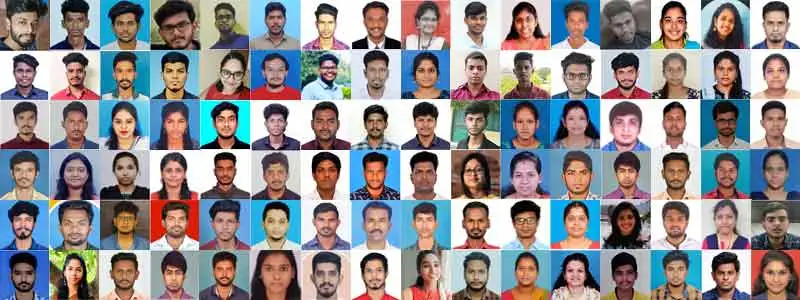
Student Success Story of Full Stack Developer Courses in Bangalore
Shalini is a B.A graduate. After graduating from college in 2019, she struggled to decide what career to pursue. She comes from a typical middle-class family with parents and an elder sister. She was eager to acquire new skills, find employment, and support her family. That was when her college mate recommended FITA Academy to her.
Shalini came to our office to enquire about the course. She was initially hesitant as she had no technical background. But our coordinators gave her the confidence to pursue further. After discussing with them, she opted for the Full Stack Developer Courses in Bangalore.
A passionate learner, she absorbed everything the trainers taught her. Throughout the course, she rarely missed classes, completed assignments and projects on time, and participated in placement training. Upon completion of the course, she received the Full Stack Course Certification.
Shalini attended the placement training offered by FITA Academy through our dedicated placement cell post course completion. She attended interviews and got placed in NTT Data and ITSS Global. Finally, he opted for ITSS Global and is now working there as a Full Stack Developer with a pay of Rs 3.5 LPA.
Key Features
FITA Academy empowers individuals with industry-relevant skills through expert-led training, transforming careers with hands-on experience.
Expert Trainers
Learn from industry professionals with hands-on experience.
Real-Time Projects
Gain practical exposure by working on live projects.

Certification
Get certified from FITA Academy and become job-ready.

Affordable Fees
High-quality courses available at a low budget.

Flexible Learning
Choose online/classroom, timings, and learning pace.
Placement Support
Access 3000+ companies for career opportunities.
Why Learn Full Stack Developer Courses in Bangalore at FITA Academy?
Live Capstone Projects
Real time Industry Experts as Trainers
Placement Support till you get your Dream Job offer!
Free Interview Clearing Workshops
Free Resume Preparation & Aptitude Workshops
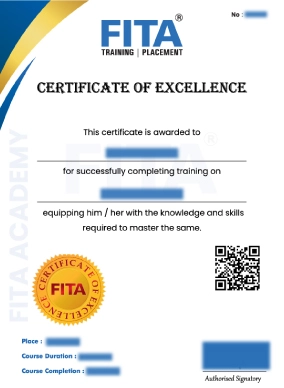
Full Stack Certification Course in Bangalore
FITA Academy will provide you with a course completion certificate by the end of the Full Stack Development Training in Bangalore. Several companies recognize this certificate as proof of your effort in this subject. This certificate provides credibility to the skills and concepts you acquired in the duration of the course.
There are no official certifications for full-stack development available. So, the certification you get by completing full-stack training at FITA Academy is a great advantage. Another added benefit is that FITA Academy certification is its global recognition. So, presenting your certificates attached to your resume will allow potential employers to prioritize your profile during interviews, opening up a wide range of career opportunities for you.
Have Queries?
Talk to our Career Counselor for more Guidance on picking the right Career for you!
Placement Session & Job Opportunities
After completing Full Stack Developer Courses in Bangalore
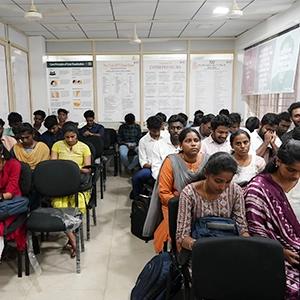
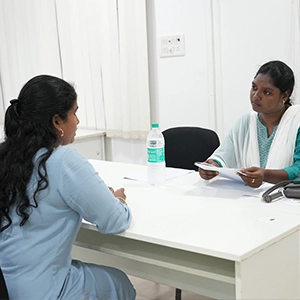
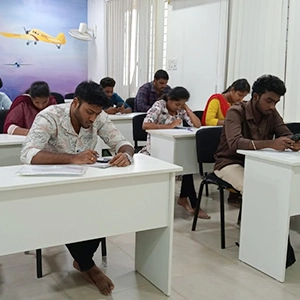
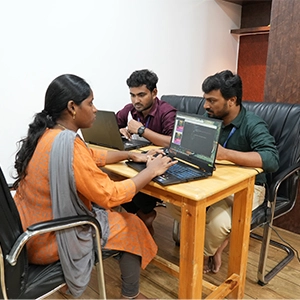
The Internet runs on web pages and applications today. With Full Stack Development, a professional can understand the workflow of each and also master them. It is for individuals interested and working in job roles revolving around UI/UX, Programming, Engineering, Development, Database Management, Networking, Product Management, Entrepreneurship, etc. This subject is best for professionals motivated to explore a career in Full Stack Development or related roles.
As of now, naukri.com delivers around 29036 full-time and part-time job openings for Full Stack Development and related careers in India. Some examples are Full Stack Developer, Mean Stack Developer, Senior Software Engineer, Java Full Stack Developer, .NET Full Stack Developer, Web Developer, UI/UX Developer, ASP.NET Developer, Team Lead, Associate Solution Engineer, Senior Product Software Engineer, Senior Cybersecurity Engineer, etc. Some companies hiring Full Stack Development experts are IBM India, Accenture, Mphasis, UnitedHealth Group, etc. FITA Academy delivers its maximum effort in providing the Full Stack Developer Course in Bangalore With Placement, enabling its students to land jobs in the above-mentioned companies after completion of the course.
“100% placement training and assistance is provided to students by the end of the Full Stack Development Course.”
The demand for full-stack developers is increasing. They have all the skills required to build a website from scratch and make it user-friendly. So, people with proper knowledge of HTML, CSS, JavaScript are more comfortable when it comes to building applications.
Knowing HTML first is a big advantage for newbies because it greatly determines how well you can code. You can easily choose the font colors without issues if you know CSS. But if you master both these two languages, nothing can stop you from getting into web development. In simple terms, a good grasp of both HTML and CSS will help you get your foot in this domain.
Knowing how data stores, databases, APIs work is vital to developing an efficient product. It would help if you also had a basic idea about cloud computing and its outcomes. Moreover, if possible, try to understand the basics of machine learning so that you can leverage AI to solve complex problems. A complete understanding of front end frameworks like Angular or React helps you build UI’s that fetch data from the backend and render it on screen.
According to the Reports furnished by Glassdoor, a Full Stack Developer Salary For Freshers is Rs 3,1,00,000 to Rs 5,45,000 as a fresher. Full-stack Developers can earn Rs 5,53,006 to Rs 7,50,000 with 1 to 4 years of experience. Full-stack Developers with 5 to 9 years of experience shall earn up to Rs 8,20,000 to Rs 1,375,689 per year.
Some of the job Opportunities After Completing the Full Stack Developer Course in Bangalore with Placement at FITA Academy are as follows:
Web Designer– The role of a web designer is to create stunning websites based on client demand. They use Adobe Photoshop, Illustrator, Fireworks, etc., to create graphics and elements. After completing a web design course, you can opt for job roles such as graphic designing, logo designing, banner advertising designing, brochure designing, etc.
Front End Developer– This is one of the hottest jobs on the market. As the name suggests, the front end developer works directly with the users and interacts with them using a browser. They take care of the UI part of the application. They use tools like HTML, CSS, JavaScript, Bootstrap, etc., to create unique designs. They work closely with designers most of the time to develop creative ideas. FITA Academy has produced several front end developers through its Full Stack Course in Bangalore, helping aspiring students to land the job.
Back End Developer– A backend developer is responsible for creating a database and other applications’ backend functionalities. They use programming languages like PHP, Ruby on Rails, Python Full Stack Developer course in Bangalore with Placement etc., to do their job. A typical example of a back end developer is an eCommerce website.
Web Developer– A web developer creates applications or websites by integrating various features. They write codes in HTML, CSS, Javascript, JQuery to achieve their goals. Some of the major tasks performed by a web developer include creating layouts, making navigation bars, fixing bugs, adding social media buttons, etc.
Mobile App Developer– With the booming popularity of smartphones and tablets, mobile apps have become indispensable for every person today. Every application needs a back end as well as front end. That is why we see an increasing number of people becoming mobile developers. If you wish to become a mobile developer, join the Full stack Developer Courses in Bangalore offered by FITA Academy.
Web Developer (Graphics Designer) – Graphic design plays a vital role in any business. They are responsible for coming up with logos, banners, posters, flyers, company profiles, etc., that represent your business’s brand image. They also help to promote products and services through advertisements and social networking sites. Getting placed in a company after completing the Full stack developer course Bangalore, you will coordinate with Graphic designers who often work in teams, so it is important to possess good communication skills. In addition, Web Developers are also skilled with specific software programs like Adobe Photoshop and Illustrator.
Software Engineer– Software engineers deal with coding and development. When it comes to coding, they use Java, C++, SQL, Python, Perl, C, Objective-C, Android, IOS, etc. They also need to understand how things work behind the scenes. Many top tech giants hire only those candidates who have completed a degree program in engineering. So if you want to get hired by these companies, you should consider this option first.
Associate Web Designer – An associate web designer focuses more on the visual aspects of the site. They create graphical designs such as icons, buttons, backgrounds, images, etc. If you are looking for a career as an Associate Web Designer, you can enroll in the Full Stack Development Course in Bangalore offered by FITA Academy.
Data Scientist– Data scientists are mostly concerned with data analysis. They collect data from different sources. Then they analyze the collected information and finally provide recommendations to improve performance. For example, suppose you sell shoes online. You will collect customer reviews about your products. These reviews will allow you to identify what kind of product will attract customers and what will not. The better the review, the higher is the chance of getting sales. This is just one example of how data science can benefit businesses.
Data Analyst– Data analysts focus on analyzing data from different sources. This could be spreadsheets, databases, surveys etc. The main goal of a data analyst is to provide actionable insights to improve overall decision-making within an organization.
Full-stack Developer – Full Stack Developer in simple words, full-stack refers to skills required to build software. It includes everything right from designing screens to building database models. FITA Academy’s Full stack Developer Courses in Bangalore are a must for anyone who wants to be in the development field.
Senior Software Engineer– A senior software engineer has at least three years of experience under his/her belt. They would have worked on several projects and has obtained enough knowledge regarding various technologies such as Java, AngularJS, CSS3, HTML5, JavaScript, jQuery Mobile, JQuery, Bootstrap, Ruby On Rails, WordPress, MYSQL, PHP, .NET, Linux, etc.
You can unlock the above job roles if you take a Full Stack Training in Banglore at FITA Academy and equip yourself with the skills needed to thrive in the field.
Pranay Kumar
The Full Stack Training in Bangalore has transformed my development career. It is one of the best training platforms in the city. My parents are also happy with this decision after looking at my fast progress. I hope to bag a good opportunity and make my mentors proud. I will cherish the skills learned in this course.
Danish Mallik
I am a Web Developer by profession. I was interested in understanding the lifecycle management process and hence decided to take up this course. My newly found skills make me confident and independent in my application. The support team is also responsible and responsive towards the issues. With their help, learning has been an easy process.
Akshara Pandit
FITA Academy trains equally well in front-end, back-end, networking, and multimedia. I was amazed by their teaching expertise and industry knowledge with each module. The Full Stack Developer Course in Bangalore is exclusively good. Thus, I encourage more students to choose it for their hands-on learning expertise.
Mithila Jain
The Full Stack Developer Course Bangalore is appropriate for learners without previous knowledge on development too. This course starts its concepts from scratch and transcends to complex proficiency. My time here has been a favorable one. I only have praises for the design that brought together this program.
Barun Yadav
I enjoy designing as much as developing. Therefore, I was looking for a course to improve my skills. The Full Stack Development Training in Bangalore has been a great choice in that part. There were no issues that could discourage me from moving ahead in this course. Thanks to FITA Academy mentors, I can create projects on my own.
Our Students Work at
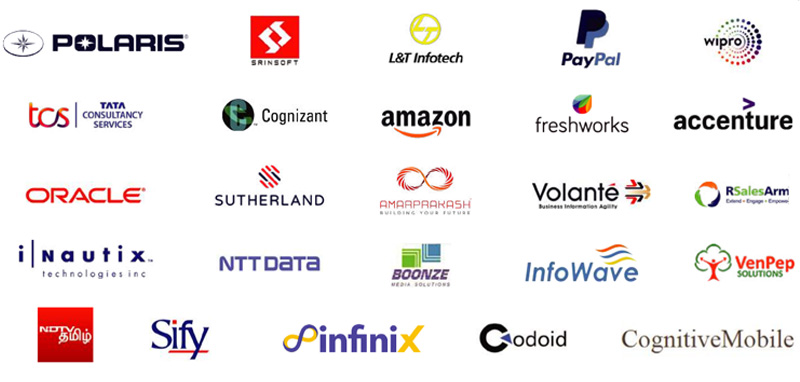
Frequently Asked Question (FAQ) about Full Stack Developer Courses in Bangalore
- The Full Stack Developer Course by FITA Academy is designed by Industry professionals with a decade of experience Web Application Development.
- FITA Academy is Best institute for Java Full Stack Developer in Bangalore, which is provides ample opportunities for candidates in learning the Web Development process by using the Front end, Back end, and Database.
- Course coverage consists of more than 60 hours, providing in depth knowledge of the subject.
- More than 1,00,000 students have created a successful career for themselves after enrolling in FITA Academy.
- Flexible class scheduling and Full Stack Developer course in Bangalore fees structure suited for both working professionals and students.
- Placement training is provided at the end of the Full Stack Development Course in Bangalore. Students are trained with Interpersonal skills, group discussions,and mock interview sessions where students will be provided knowledge about Full Stack Developer Interview Questions and Answers.
- FITA Academy’s Full Stack web development course in Bangalore with Placement offers job opportunities with tie-ups over 3,000 small, medium, and large organizations.
- FITA Academy has a dedicated Placement cell to assist students in finding jobs and preparing for interviews through many group discussions and Interview Tips.
- FITA Academy was started in the year 2012 by a group of IT experts with the aim of delivering world-class IT training at affordable costs.
- FITA Academy so far, since its inception, has trained more than 1,00,000 students and working professionals
- Our Full Stack development course in Bangalore offline course sized for five to six members to help students understand challenging concepts, instructors reduce the class size.
- We provide individualized attention for our learners by keeping the batch size as minimum as possible.
Yes. FITA Academy places high importance on practical training. It hence provides hands-on training of the highest quality to the students through various case studies, Full Stack Developer Tutorial and project implementation.
- The instructors are industry professionals with a decade of expertise in software Development.
- The trainers at FITA Academy’s Full Stack Developer Courses in Bangalore are experienced in various designations in the industry such as Web Development specialists and senior software developers.
- Students will gain the best practical hands-on training and Corporate Training under the guidance of our expert trainers.
General Q & A about Full Stack Developer Courses in Bangalore
How much does a full-stack developer course cost?
Is 3 months enough for full-stack developer?
What is the salary for a Full stack developer in Bangalore?
Which institute is provides the Best Full Stack Developer Course in Bangalore?
Is full stack good for freshers?
Is full-stack still in demand?
Is full stack easy or hard?
What coding language is full stack?
Can a non IT person become full stack developer?
What is the highest paying full stack developer job?
- IBM
- Mobile Programming India Pvt Ltd
- Accenture
- Wipro
- 2COMS Consulting Pvt Ltd
Which full stack is easy?
Does full stack have a future?
What are the minimum skills for full stack developer?
- HTML/CSS.
- JavaScript.
- Frontend frameworks.
- Backend technologies.
- Databases and web storage.
- Git/GitHub.
- HTTP and REST.
These skills can be acquired if you enroll in Full Stack Developer Courses in Bangalore at FITA Academy
Does Google hire full stack developer?
Does full stack use Java?
Who is a full stack engineer?
Can a fresher get Full Stack Developer job?
What is the salary of Full Stack Developer in TCS?
What is the salary of Wipro Full Stack Developer?
What is the salary of Full Stack Developer in Google?
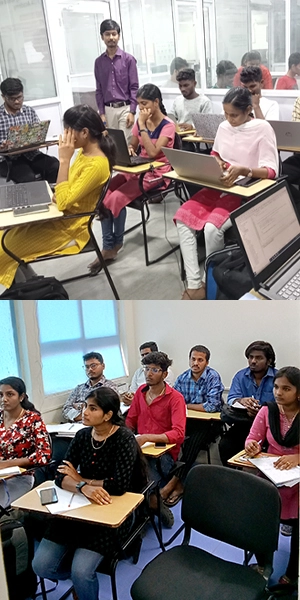
Related Blogs
- Why Web Developers choose AngularJS?
- Real-World Examples of Python in Web Development
- Benefits of a Unique Web Design
- Essential Tools for Modern Software Development
- Mastering CSS: Tips, Tricks, and Techniques
- Highest Paying Web development skills
- Scope of Python – In-Demand Career Prospects of Python


